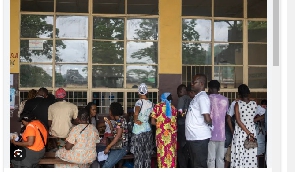The full results of Democratic Republic of Congo's election are expected shortly, with President Félix Tshisekedi enjoying a commanding lead over opposition candidates who have demanded a rerun.
President Tshisekedi has received about 72% of the votes announced so far, and appears set for a second term.
The 20 December election was marred by widespread logistical problems.
It had to be extended to a second day in some parts of the vast country.
About two-thirds of polling stations opened late, while 30% of voting machines did not work, according to an observer group.
Millions of people waited for hours before they were able to vote, while some gave up and went home.
The opposition said the problems were part of a deliberate plan to allow the results to be rigged in favour of Mr Tshisekedi.
Several of the main challengers have called for protests after the results are announced on Sunday.
"We call on our people to take to the streets en masse after the proclamation of the electoral fraud," they said in a joint statement dismissing the "sham" election.
The head of the election commission has previously said the opposition candidates wanted a new election because "they know they lost... they are bad losers".
Election chief Denis Kadima acknowledged some irregularities but insisted that the results announced so far reflected the will of the Congolese people.
The former president of Kenya, Uhuru Kenyatta, has already posted a message on X congratulating Mr Tshisekedi on his re-election.
Football tycoon and mining magnate Moise Katumbi is in second place with about 18% of the vote, while former oil executive Martin Fayulu, who claims he was robbed of victory in the 2018 election, is in third place with about 5%.
Election officials have still not said exactly how many polling stations opened or how many people voted.
Some 17.8 million votes have been counted so far, from 55,000 of the 76,000 polling stations. About 44 million people were registered to vote.
It is not clear if any of the 18 opposition candidates will challenge the results in court - Mr Katumbi has already said it isn't worth it, because the courts are not independent.
The Constitutional Court has 10 days to hear any legal challenges before it is due to announce the final results on 10 January 2024, with the swearing-in ceremony scheduled for 20 January.
DR Congo is roughly four times the size of France, but lacks basic infrastructure. Even some of its main cities are not linked by road.
About two-thirds of the country's 100 million population live below the poverty line, earning $2.15 (£1.70) a day or less.
Voters also chose parliamentary, provincial and municipal representatives, with about 100,000 candidates in total.
The elections were not held in parts of the east because of the fighting which has raged in the area for the past three decades.
Dozens of armed groups have been battling to control parts of the region, home to much of the country's vast mineral wealth.
This includes vast reserves of cobalt, a vital part of many lithium batteries, seen as essential to a future free of fossil fuels.
Africa News of Sunday, 31 December 2023
Source: bbc.com

















